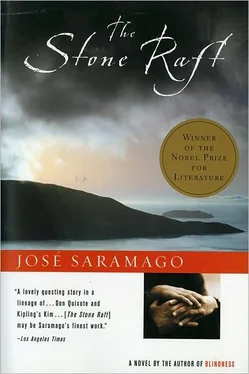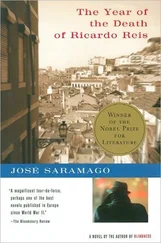On the last night in the house, they were late getting to bed, they sat up talking for hours on end, as if the following morning was to be one of sad farewells, with each of them going his separate way. But staying together like this was one way of keeping up their spirits, it is a well-known fact that canes start to break the moment they are separated from the bundle, everything breakable has already been broken. They spread out the map of the peninsula on the kitchen table, as drawn here it is still incongruously joined to France, and they marked out the first day's itinerary, the inaugural route, taking care to choose the least bumpy roads, in view of the feeble strength of their scraggy horse. But they would have to make a side trip to the north, as far as La Coruña, where Maria Guavaira's demented mother was in a mental institution, daughterly love decrees that she go and rescue her from that pandemonium, for one can imagine the panic in that bedlam, an enormous island bursting through the front door, hurling itself onto the city and sweeping before it the anchored boats, and all those glass-paned windows on the avenue on the waterfront shattering to smithereens at the same time, and the demented inmates thinking, if they are capable of thinking in their lunacy, that the Day of Judgment has finally come. Maria Guavaira will have the honesty to say, I don't know what life is going to be like with my mother in the wagon, even if she isn't really violent, bear with me, it's only until we reach a place of safety. They promised to be patient, they would arrange things as best they could, but as we know very well not even the greatest love can withstand its own madness, so how will it cope with another's madness, in this case that of the insane mother of one of the insane Just as well that José Anaiço had the fortunate idea of telephoning for information from the first place where it was possible, the health authorities might well have transferred or be about to transfer the inmates to a place of safety, for this is not one of your classical shipwrecks, the first to be rescued here are those who are lost.
The couples finally withdrew to their rooms, they did what people normally do on these occasions, who knows if we will ever come back, so let the vibrations of carnal love between humans remain, that love with no equal among the species, made as it is of sighs, murmurings, impossible words, saliva and sweat, anguish, implored martyrdom, Not just yet, one is dying of thirst yet refuses the water of freedom, Now, now, my love, and this is what old age and death will steal from us. Pedro Orce, who is old and already bearing the first sign of death, which is solitude, left the house once more to go and take a look at the stone ship, accompanied by the dog, which has every name and none, and in case you are about to say that if the dog accompanied him then Pedro Orce is no longer alone, do not forget the animal's remote origins, the hounds of hell have already seen everything, and because they have such a long life they accompany no one, it is the humans who live for such a short time who accompany dogs. The stone ship stands there, the prow is as tall and pointed as on the first night, Pedro Orce is not surprised, each of us sees the world with the eyes he possesses, and eyes see what they choose to see, eyes create the world's diversity and fabricate its wonders, even if they're only made of stone, its tall prows, even if they're only an illusion.
The morning awoke overcast and drizzly, a familiar figure of speech but one that is incorrect, because mornings do not awaken, it is we who awaken in the mornings, and then, going to the window, see that the sky is covered with low clouds and the rain is drizzling down, tiresome for anyone caught in it, but such is the power of tradition that if there were a ship's log book on this journey of ours, the clerk would inscribe his first paean as follows, The morning awoke overcast and drizzly, as if the skies were gazing down with disapproval on this adventure, the skies are always invoked in these instances, whether it rains or shines. Deux Chevaux, with one mighty heave, replaced the wagon under the tiled roof, or rather the thatch, for this is not a garage but a lean-to exposed to the elements. Abandoned like this and without its canvas hood, which was used to patch the awning on the wagon, the car already looks like a wreck, objects suffer the same fate as people, when they have outlived their usefulness they are discarded, they are discarded once they no longer serve any purpose. The wagon, on the other hand, despite being ancient, has been rejuvenated after being taken out into the open air, the wagon is restored as the rain washes it down, being put into action has always had this admirable effect, just look at the horse, covered with an oilcloth to protect its back and looking almost like a charger in a joust, caparisoned for battle.
These descriptive interludes should cause no surprise, they're ways of showing how difficult it is to uproot people from places where they have been happy, all the more so since these people are not fleeing in panic, Maria Guavaira is now closing the doors carefully, she sets free the hens that are being left behind, releases the rabbits from their hutch, the pig from the sty, these are animals accustomed to being fed and now left to God's mercy, if not to the wiles of Satan, for the pig is quite capable, should the mood take it, of attacking the other animals. When the younger of the two farmhands arrives he will have to break a window to enter the house, there is no one for leagues around to see him break in. If I break in, there's good reason for doing so, these are his words, and perhaps it is true.
Maria Guavaira climbed into the driver's seat, beside her sat Joaquim Sassa with open umbrella, his duty is to accompany the woman he loves and to protect her from the inclement weather, he cannot do her job for her, because of the five persons here only Maria Guavaira knows how to drive a wagon and horse. Later in the afternoon when the sky clears, she will teach them. Pedro Orce will insist upon being the first to receive some basic training, a thoughtful gesture on his part, so that the two couples may relax under the awning with no unwelcome separations, the driver's seat is spacious enough for three, an ideal solution that allows the other two to be together, even if this only means sitting quietly side by side, in silence. Maria Guavaira shook the reins, the horse, hitched between the shafts of the wagon with no partner at its side, gave the first pull, felt the harness tugging, then the weight of the load, memories came flooding back to its old bones and muscles, and the almost forgotten sound returned, that of the earth being crushed beneath the rotating metal rims of the wheels. You can learn, forget, and learn everything anew, when forced by necessity. For several hundred meters the dog accompanied the wagon in the rain. Then it saw that it could travel in the shelter of that great encumbrance while still on foot. It got under the wagon, fell into step with the horse's rhythm, and that is how we will see the dog for the rest of the journey, come rain or shine, since it has no wish to act as guide or to amuse itself with all those senseless comings and goings that make men and dogs seem so similar.
That day they did not travel far. They had to conserve the horse's strength, all the more so since the bumpy road demanded constant effort, whether pulling the wagon on the way up or slowing down in the descents. There was not a living soul as far as the eye could see. We must have been the last people to leave these parts, Maria Guavaira said, and the clouded sky, the leaden atmosphere, the gloomy landscape were like the dying breath of a world at its end, desolate, expiring after so much sorrow and weariness, so much living and dying, so much resolute life and subsequent death. But new loves travel in this wagon, and new loves, as those who have observed them know, are the greatest force in this world, they fear no misfortune, since by their very nature new loves are themselves the greatest misfortune of all, a sudden flash of lightning, joyful surrender, disquieting confusion. But one must not put too much trust in first impressions, in this almost funereal appearance of this departure, in the dreary rain, from a deserted country it would be better, were we not so discreet, to listen carefully to the conversations between Joana Carda and José Anaiço, between Maria Guavaira and Joaquim Sassa, Pedro Orce's silence is even more discreet, it is almost as if he were not here at all.
Читать дальше












